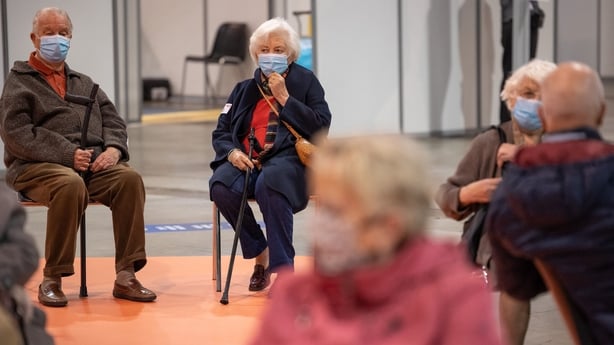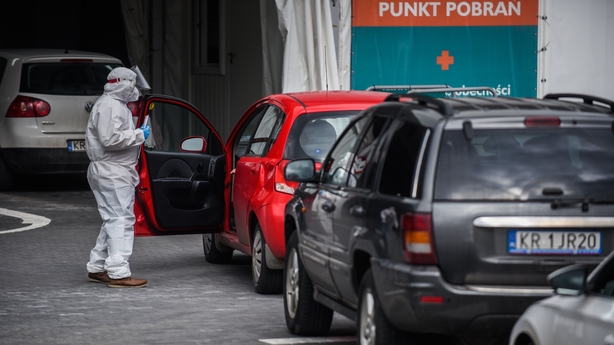German Chancellor Angela Merkel has reversed a planned strict Easter shutdown, the chief of her CDU party said, amid massive criticism of the government's pandemic management.
Ms Merkel and the leaders of Germany's 16 states had agreed at marathon talks on Monday that almost all shops were to be closed from 1 April to 5 April, with only grocers allowed to open on Saturday 3 April.
But they have now scrapped that measure, instead appealing to the public to stay home over the Easter weekend, CDU chief Armin Laschet told a regional parliament meeting in the state of North Rhine-Westphalia.
The leaders had agreed the measure was "a mistake and not enforceable in this form", he said.
Ms Merkel had called an unexpected crisis meeting this morning as a backlash over the pandemic measures sent her CDU party's ratings plummeting.
The leaders were expected to "talk very critically about what happened two days ago", Mr Laschet said ahead of the meeting.
"The idea of an Easter shutdown was drafted with the best of intentions. We urgently need to stop and reverse the third wave of the pandemic," Ms Merkel said.
But it was not possible to implement the hastily agreed measures so quickly, she said, and apologised for added uncertainty that it had raised for Germans.
"This mistake is mine alone," she said.
Ahead of a press conference, Der Spiegel news magazine said the chancellor had also admitted the Easter shutdown was a "mistake".
The toughened shutdown had prompted fierce criticism, with the Bild daily calling the government's pandemic management a "mess".
"Merkel and the (regional leaders) have lost sight of the real problem," it said.
Der Spiegel called the measures a "scandal", claiming the government had "completely the wrong priorities" and should instead focus on improving its vaccination campaign and test strategy.
Infection numbers continue to rise in Germany, with 15,813 new cases reported in 24 hours today by the Robert Koch Institute (RKI) health agency.
As well as ordering the Easter shutdown, Ms Merkel and the regional leaders agreed on Monday night to extend existing virus measures including keeping cultural, leisure and sporting facilities shut through to 18 April.
"The situation is serious. Case numbers are rising exponentially and intensive care beds are filling up again," she said after announcing the measures.
The variant first detected in the UK has become the dominant strain circulating in Germany, she said, noting: "We are in a new pandemic."
But patience is running thin in the country over a sluggish vaccine rollout, a delayed start to mass rapid testing and higher infection numbers despite months of shutdowns, with support for Ms Merkel's Christian Democratic Union party at its lowest level for a year.
Europe's top economy will elect a new government in September, as Ms Merkel is retiring after 16 years in power.
Belgium renews partial lockdown to tackle third virus wave
Belgium has announced a renewed partial lockdown of four weeks, with schools closed and non-essential stores open to customers by appointment only.
The decision came as a potential third wave of the coronavirus was gaining momentum, with hospitalisations on the rise.
The pandemic "is a big lesson in humility for politicians, for everyone," said Prime Minister Alexander De Croo in announcing the measures.
The measures will begin on Saturday and the intention remains to fully reopen the schools and ease the restrictions on 19 April.
Businesses with close contact with customers - mainly hairdressers, tattoo parlours and beauty shops - will be shut at least until that date.
In the new rules, the "outside bubble", the maximum number of people with which you are allowed to be with in public, will be reduced from 10 to four.

The school closure will begin a week ahead of a two-week Easter holiday, with the government trying to limit the impact on parents.
With Belgium already subject to a night curfew, a work-from-home edict and a general travel ban into and out of the country, the blame was put on the spread of the variant first detected in the UK, which is more contagious and can have more severe effects.
Poland likely to toughen restrictions as cases rise
Poland will likely have to toughen Covid-19 restrictions again after reporting what early figures suggest will be a record number of new infections, the prime minister's top aide Michal Dworczyk has said.
The government ordered theatres, shopping centres, hotels and cinemas to close last week after a rise in cases, driven by the variant of the coronavirus first detected in Britain.

But there have been growing media reports that it will have to bring in more curbs ahead of the busy Easter holidays, usually marked by packed church services and family gatherings.
"We are waiting for the final data but all indications are that we will have over 29,000 new infections," Mr Dworczyk told private television broadcaster Polsat News.
That would break the daily record of 27,875 new cases reported in November.
"We cannot remain indifferent to this situation and we will have to take decisions that will be communicated tomorrow," Mr Dworczyk said.
He declined to provide details on the curbs.
Sweden to end travel ban for people travelling from Norway and Denmark
The Swedish government will end the travel ban for people travelling from Norway and Denmark to Sweden on 31 March, as the measure is no longer necessary for reducing the spread of the coronavirus, it said.
All people travelling to Sweden will still need a negative Covid-19 test to enter the country.
"This means, among other things, that Norwegians and Danes can travel to their holiday homes in Sweden and that families and friends across borders can meet each other," Mikael Damberg, Minister of the Interior, told a news conference.
France still facing several difficult weeks due to Covid - minister
France is facing several difficult weeks ahead due to the new spread of Covid-19, which has led the government to enforce a new lockdown in some parts of the country, Interior Minister Gerald Darmanin said.
"We still have several difficult weeks ahead of us", he told BFM TV.
The head of the intensive care unit at a Paris hospital, Jean-Francois Timsit, told France Inter radio that the coming month will be "infernal" for the French hospital system due to the third wave of the disease.
Meanwhile, French infectiologist Odile Launay has said that that the Pfizer and the AstraZeneca Covid-19 shots have the same efficiency in severe cases of the disease.
Separately, France's culture minister has been hospitalised with Covid-19 but its employment minister has been discharged after receiving treatment over the past few days.
Culture Minister Roselyne Bachelot, 74, will remain under surveillance for a few days, her ministry said in a statement, adding that her condition is stable.
The news came as Employment Minister Elizabeth Borne, 59, tweeted that she had left hospital. She was hospitalised last Friday, eight days after testing positive for Covid-19.
President Emmanuel Macron tested positive for Covid-19 in December and had to self-isolate. At least eight ministers in his government, including Finance Minister Bruno Le Maire, have tested positive for Covid-19 in recent months.
Paris and a large part of northern France, as well as the area around Nice on the Mediterranean, went into a third lockdown last weekend as the government tries to slow the spread of the virus.
India detects novel coronavirus variant
India's health ministry said that a variant of the coronavirus had been detected in the country in addition to many other variants of concern (VOCs) also found abroad.
"Though VOCs and a new double mutant variant have been found in India, these have not been detected in numbers sufficient to either establish a direct relationship or explain the rapid increase in cases in some states," the health ministry said in a statement.

